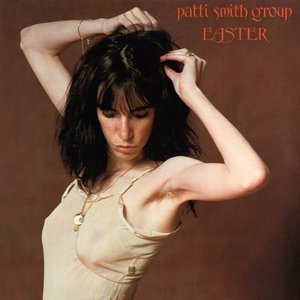Published on May 24, 1999
I’m not overly familiar with the output of this band, but I
received a request to review of this album and so feel honour-bound
to oblige…
Patti Smith, the vocalist and driving force behind the band,
comes from an art and literature background, and her poetry figures
prominently in her music. I can only assume that Smith comes from a
religious up-bringing, as there are numerous, possibly irreverent,
references to Christ. Richard Sohl is the under-employed
pianist/keyboardist, Lenny Kaye the competent, but unexceptional,
guitarist. Ivan Kohl plays bass and J D Daugherty drums.
Easter is the third release by the band, and probably its
most famous one. The follow-up release,
Wave, was produced by Todd Rundgren.
“Till Victory” represents a cautious start to an album I had
been led to believe would be seminal and pithy. As it is, the
opening song is an average sort of rock’n’roller. Uninspired guitar
chords and organ, with drumming on a par with that of Clem Burke
from Blondie, whose single “Denis” came out the same year.
“Space Monkey” delivers more. It is distinctly R&B, with a
pleasant tremolo organ effect. The first of Smith’s idiosyncratic
monologues is featured, but it’s the only one on the album that
culminates in an orgasm, as far as I am able to determine. I see
this song featuring in the “incomprehensible lyrics” round on a
future edition of the BBC game show, “Never Mind The
Buzzcocks”.
The anthemic, soulful, and rightfully lauded “Because The Night”
follows. Thoughtful lyrics, tinkly piano and a rocking beat
conspire to create a very satisfying whole. The single was, if I
recall correctly, played a great deal on radio on its release and
hit the Top 5 in the UK. I understand it was co-penned by Bruce
Springsteen. I find myself wondering what have happened if Meat
Loaf had performed the song in 1978, at his
Bat Out Of Hell best – it has that Steinman feel.
A complete change of pace, plus a suspicion of World Musicality,
is evident in “Ghost Dance”. I welcome the change of direction, but
I have to say that this track leaves me cold. A combination of
acoustic guitar, bongos and jingle-bells suggest Folkiness, but
Smith’s bleak vocals are not in keeping. In the end, it’s
overlong.
I like “Babelogue” – performed live, it’s an amusing, meandering
tirade, spoken at a progressively breathless, break-neck pace. I
was suddenly reminded of (and not for the last time) Adrian Belew’s
strangely compelling monologue on “Theela Hun Ginjeet” from the
1981
Discipline album. The track segues into “Rock’n’Roll Nigger”
and the transition works very well. Smith’s vocals are best
enjoyed, in my opinion of course, when she is reaching for the
higher registers, as here, and the piano is high in the mix at
times, giving a much-needed extra instrumental dimension. At times,
I was reminded of the main refrain from “Get Back”. Cultural icons
as diverse as Jimi Hendrix, Jackson Pollock and Jesus Christ all
receive attention.
“Privilege (Set Me Free)” threatens to break into some kind of
“Leader Of The Pack” throwback, but mercifully pulls back from the
brink. An organ and drums intro gives way to a standard, if
somewhat angst-ridden rocker. We are treated to a rendition of
Psalm 24 interspersed amongst the music; gimmicky, but not
unpleasant.
“We Three” starts promisingly enough with a delightful guitar
effect worthy of a Steve Hackett, but then launches into a dirge. I
kept hoping for a doo-wop, shoop-shoop chorus, but it never came.
Tedious.
“25th Floor” gets us back in the groove – prominent bass and
aggressive, growly lead guitar combine effectively, plus a
trademark monologue. The subject-matter seems to be ecologically
motivated – something about “transformation of wastes” – or maybe
Smith is talking about the first thing that pops into her head.
Said vocals overlay a pleasing, instrumental noodling. At some
stage, we find we have segued into “High On Rebellion”, but each
time, the transition evades me.
The final track is “Easter”. A somewhat different sound and feel
to this one, with an almost progressive development of lead guitar
on the plus side, but on the other hand, the sound of the cymbal
grates after a while. There is a monologue that is to me suggestive
of that on “No 1 Lowest Common Denominator”, by Todd Rundgren.
I have to say that, having finally gotten round to this album, I
have no regrets at the delay. A moderate effort, although “Because
The Night” on its own nearly makes it worth owning the album. On
balance, not much here for a self-confessed Prog-head, but your
mileage may, as always, vary.
